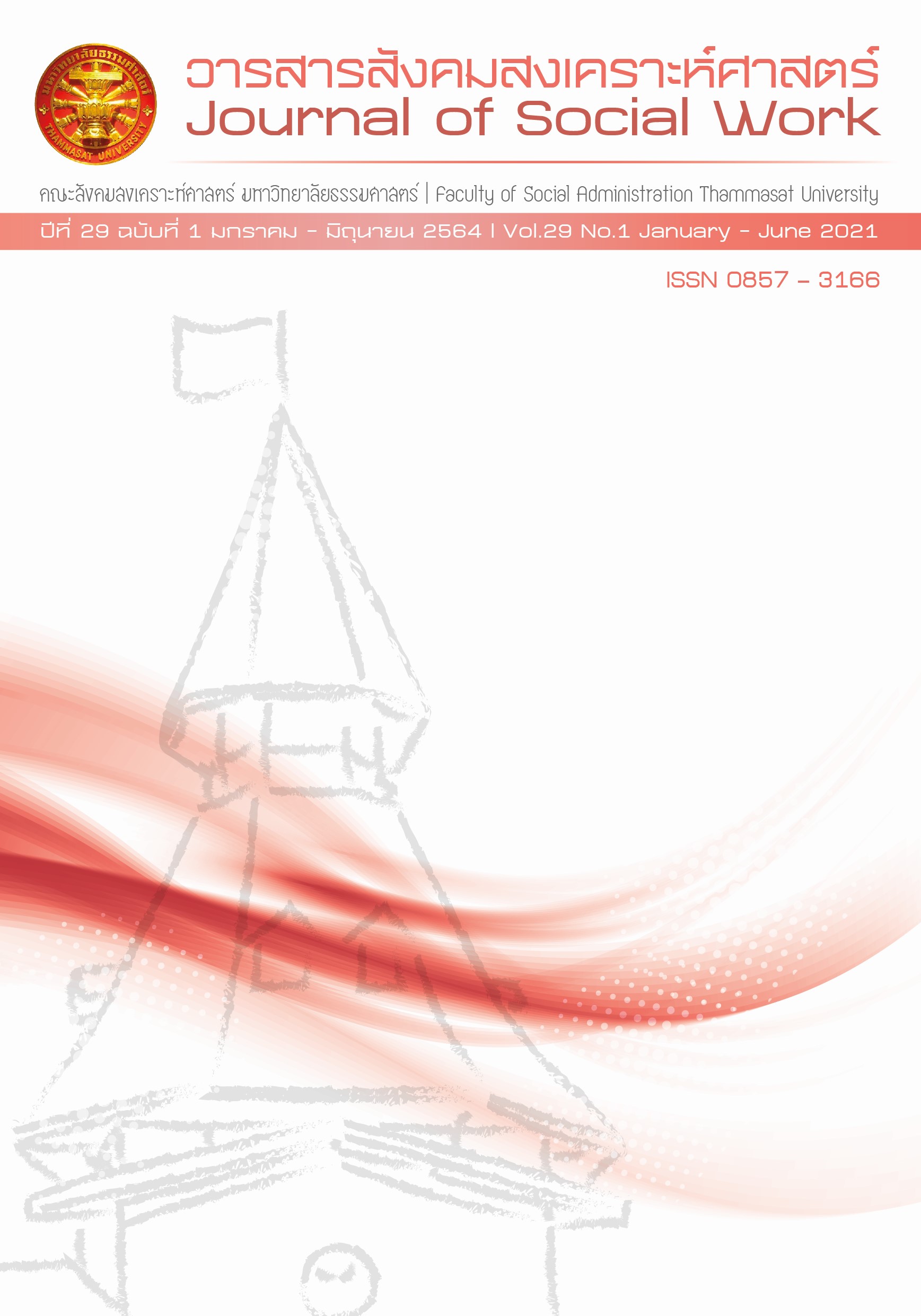Cultural Council Executive Structure Development through Local Network Collaboration under the National Cultural Act 2010
Keywords:
Cultural council, participation, cultural networkAbstract
The objectives of this research are to create cultural council models and policy proposals that lead to development application, improving provincial cultural council operations and broaden the results to neighboring provinces, and conducting provincial cultural council board of director structure development course via local network participation per National Culture Act B.E. 2553 (2010). A trial and error of said development course will be conducted on 8 pilot provinces to evaluate awareness and understanding on the operations of cultural councils, on putting the policy into practice on local areas, and on success factors based on said operations via local network participation. The pilot provinces will process knowledge obtained from studying, analyzing and comparing the differences between cultural councils per National Culture Act B.E. 2553 (2010) and chamber of commerce per the Chambers of Commerce Act B.E. 2509 (1966). They will also process issues and obstacles of operations related to cultural councils per the National Culture Act B.E. 2553 (2010) to find improvements that would strengthen provincial cultural council board of director structure and effectively be self-reliable. The research results found that 1) operations of cultural councils should comprise of components from cultural promotion with collective goals, participating in cultural council activities as culture is the people’s property, and elevating culture into a innovative economy that promotes current way of life; 2) developing cultural council board of director structure that branches out cultural networks and strengthen the structure through participation of involving network agencies acting as the core of cultural network operations; 3) a desirable cultural council should act as a model on promoting, preserving, restoring and broadening local cultures by placing importance on local people (the owner of these cultures) and involving them to participate and create jobs and income; promoting economy alongside preserving culture. Furthermore, a concrete and practical operations need to be put in place regarding staffs, locations, budgets. Those participating in cultural council must come from diverse sectors and promote people of all ages to adopt more roles in the cultural council’s operations; 4) policy proposal and practical implementation on the development and improvement of cultural council board of director structure include proposals regarding the council’s operations, the structure of cultural council board of director, the promotion of cultural network participation and the administration
References
กรมส่งเสริมวัฒนธรรม. (มกราคม-มีนาคม 2556). 8 สิ่งควรรู้กับมรดกภูมิปัญญาวัฒนธรรม. วารสารวัฒนธรรม, 52, 12.
กระทรวงวัฒนธรรม. (2550). แผนแม่บทวัฒนธรรมแห่งชาติ (2550-2559). กรุงเทพฯ: ผู้แต่ง.
โกวิทย์ พวงงาม และคณะ. (2550). การส่งเสริมการมีส่วนร่วมของประชาชนด้านการกระจายอำนาจสู่ท้องถิ่นตามรัฐธรรมนูญ. กรุงเทพฯ: มิสเตอร์ ก๊อบปี้ (ประเทศไทย).
โกวิทย์ พวงงาม และคณะ. (2551). โครงการส่งเสริมการมีส่วนร่วมของประชาชนด้านการกระจายอำนาจสู่ท้องถิ่นตามรัฐธรรมนูญ. รายงานผลการศึกษาวิจัย. สถาบันวิจัยและให้คำปรึกษาแห่งมหาวิทยาลัยธรรมศาสตร์.
จิตติ มงคลชัยอรัญญา. (ม.ป.ป.). แนวทางในการทำงานกับกลุ่ม. (เอกสารอัดสำเนา).
นิคม มูสิกะคามะ. (2545). วัฒนธรรม: บทบาทใหม่ในยุคโลกาภิวัตน์. กรุงเทพฯ: กรมศิลปากร.
ประเวศ วะสี. (2527). วัฒนธรรมกับการพัฒนา. กรุงเทพฯ: สำนักงานคณะกรรมการวัฒนธรรมแห่งชาติ.
ปาริชาติ วลัยเสถียร. (2552). กระบวนการและเทคนิคการทำงานของนักพัฒนา (พิมพ์ครั้งที่ 4). กรุงเทพฯ:
โครงการเสริมสร้างการเรียนรู้เพื่อชุมชนเป็นสุข (สรส.).
เมธาพร คงคาน้อย. (พฤษภาคม-สิงหาคม 2554). นโยบายและแนวทางส่งเสริมการปฏิบัติงานของสภาวัฒนธรรมในประเทศไทย. กลุ่มมนุษยศาสตร์และสังคมศาสตร์ Veridian E-Journal SU, 4(1), 623-644.
วนิดา อินทรอำนวย. (2559). พ.ร.บ. ส่งเสริมและรักษามรดกภูมิปัญญาทางวัฒนธรรม พ.ศ. 2559. กรุงเทพฯ: สำนักงานเลขาธิการสภาผู้แทนราษฎร.
วรพจน์ วงศ์กิจรุ่งเรือง และ อธิป จิตฤกษ์. (2554). ทักษะแห่งอนาคตใหม่: การศึกษาเพื่อศตวรรษที่ 21. กรุงเทพฯ: โอเพ่นเวิลด์ส.
วรากรณ์ สามโกเศศ. (2545). โลกนี้ไม่มีอะไรฟรี 3. กรุงเทพฯ: มติชน.
เสริมศักดิ์ ขุนพล. (2558). การศึกษาอัตลักษณ์ทางวัฒนธรรมความเชื่อของชุมชนเกาะยอ. วารสารปาริชาตมหาวิทยาลัยทักษิณ, 28(3) (ฉบับพิเศษ), 82-203.
สำนักงานคณะกรรมการวัฒนธรรมแห่งชาติ. (2550). เอกสารประกอบการประชุมชี้แจงแนวทางการดำเนินงานวัฒนธรรมร่วมกับองค์กรปกครองส่วนท้องถิ่น. ณ จังหวัดร้อยเอ็ด วันที่ 19 สิงหาคม 2550.
อมรรัตน์ เทพกำปนาท. (2548). ความหมาย แนวคิดและประเด็นที่เกี่ยวกับ “วัฒนธรรม”. กระทรวงวัฒนธรรม, สำนักงานคณะกรรมการวัฒนธรรมแห่งชาติ, กลุ่มประชาสัมพันธ์.
Cohen, and Uphoff. (1980). Participation’s Place in Rural Development: Seeking Clarify Through Specificity. World Development.
Franklyn, Lisk. (1985). Popular participation in planning for basic needs: concepts, methods and practices. Hants, Gower.
Howkins, John. (2002). The Creative Economy: How People Make Money from Ideas. Penguin Books Limited, Jun 27.
Reeder, William W. (1974). Some Aspects of The Informal Social Participation of Farm Families in New York State. New York, Cornell University.
UNESCO. (2001). Meetings on intangible cultural heritage (co-)organized by UNESCO 2001. Retrieved from https://ich.unesco.org
Downloads
Published
How to Cite
Issue
Section
License
The manuscripts published in the Social Work Journal is the copyright of the Social Work Journal, Thammasat University
Any article or opinion appeared in the Social Work Journal will solely be under the responsibility of the author The Faculty of Social Administration, Thammasat University and the editors do not need to reach in agreement or hold any responsibility.



